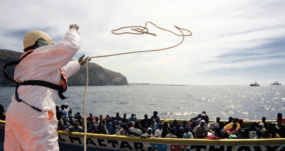The UN’s sanctions this week against six kingpins involved in human smuggling and trafficking markets will send out a strong message to transnational criminal networks.
On 7 June, the UN Security Council took the unprecedented step of targeting six individuals with sanctions over their alleged involvement in Libya’s transnational human smuggling and trafficking rings.
An asset freeze, travel bans and other punitive measures were imposed on four Libyan nationals – Mussab Abugrein (aka Doctor Mussab), Ahmed Al Dabbashi (who goes by the moniker Al Amu – ‘the uncle’), Mohammed Kushlav (aka Al-Gsab) and Abdulrahman Milad, aka Al Bija. The other two men on the sanctions blacklist are notorious Eritrean people smuggler Ermias Ghermay and Eritrean Fitwi Abdelrazak.
The move is a serious one and will have an impact on Libyan criminal networks, even if the six remain out of the reach of international justice, as have many others facing sanctions before them.
The Global Initiative Against Transnational Organized Crime has time and again called for the use of targeted actions as well as naming and shaming in dealing with these forms of organized crime in Libya, which have proved to be an effective ‘stick’ in the past.
In the past year, international exposure has conditioned gang leaders to reduce their profile, wind down their operations or even, in some cases, prompted a move into law enforcement, in mixed attempts at reputation laundering. More generally, such measures pierce the aura of invincibility of the targeted smugglers and send a warning to the industry as a whole.
The right names on the list?
Three of the Libyans included on the Security Council list – Al Amu, Al-Gsab, and Doctor Mussab (reportedly called that because of his degree of professionalism) – are without question among the biggest kingpins in the Libyan West Coast’s vast black market, and are appropriate targets for sanction. That said, Al-Gsab’s scale of involvement in the fuel smuggling industry far outstrips his human smuggling operations.
Together, these men form part of an ecosystem of militiamen who have come to dominate the sociopolitical landscape of Libya’s west coast. Abugrein is the only one on the sanctions list who is not a militia leader in his own right – although he is seen as the financier of a militia, the Al Wadi Battalion of Sabratha.
The two East Africans targeted by the Security Council, Ghermay and Abdelrazak, are technically known as manadeeb (brokers) who grew so powerful, between 2012 and 2015/16, that many migrants who travelled through Libya using their networks often believed they were actually ru’us (‘heads’ or network leaders). In fact, as noted in the narrative put forward by the Security Council to justify the sanctions against these individuals, both men worked for Libyans, one of whom was Mussab Abugrein.
Ghermay and Abdelrazak, and several other similar East African players, were critical in helping to connect the Libyan smuggling and trafficking industry transnationally to a sophisticated network of smugglers, brokers and hawaladars (paperless money-transfer agents) working along the routes connecting various East African countries to Libyan coastal migrant hubs via the Sudanese capital, Khartoum.
Perhaps the only surprising name on the list is that of Al Bija, a Libyan coastguard captain with whom I have spent some time. Despite his official job title, there is no question that Bija is first and foremost a militiaman – although thuwar (revolutionary) is probably the term he would prefer. Al Bija’s modus operandi sits uneasily with the activities of a disciplined force like the Libyan navy and coastguard.
In that respect, he too is an important member of the West Coast’s militia ecosystem. Nonetheless, his profile in terms of his involvement in Libya’s black market is nowhere near the scale of the others, including his cousin and fellow sanctionee, Al-Gsab.
Among other things, Al Bija is accused by the Security Council of ‘the sinking of migrant boats using firearms …’ and of intercepting migrants who were then taken to a detention centre where they were ‘reportedly held in brutal conditions and subjected to beatings’.
These are serious allegations. But they could equally be applied to many law-enforcement entities in Libya, be they legitimate bodies or militias, including partners of the international community, who may well have contributed to the information-gathering process that led to these sanctions.
A carrot too small
For targeted actions to have a lasting effect they must be leveled in a justifiable manner that is also seen to be even-handed by players on the ground. Sanctions must also be deployed as part of a broader carrot-and-stick strategy that clearly differentiates between the most serious offenders and the smaller players.
Failing to make this distinction in a consistent and meaningful way risks tilting the risk-equation for militiamen too far in the wrong direction. If there is everything to lose and nothing to gain, and the system seems rigged against them, then leading smugglers will quickly realise there are few incentives to cooperate with the international agenda.
The result is likely to be a return to maximizing profits from pushing people out to sea, a further scale-up of the militia-driven arms race along the coast, and the prospects of a peaceful political transition for Libya receding still further.
El Consejo de Seguridad de las Naciones Unidas saca su “gran garrote” en Libia
Las sanciones que impuso la ONU esta semana contra seis cabecillas de redes de tráfico ilícito de migrantes y trata de personas envían un mensaje claro a las redes delictivas transnacionales.
El 7 de junio, el Consejo de Seguridad de la ONU tomó una medida sin precedentes al sancionar a seis individuos por supuesta participación en redes transnacionales de contrabando de migrantes y trata de personas en Libia.
Las sanciones implican el congelamiento de activos, la prohibición de viajar y otras medidas punitivas sobre cuatro ciudadanos libios – Mussab Abugrein (también conocido como Doctor Mussab), Ahmed Al Dabbashi (alias Al Amu – ‘el tío’), Mohammed Kushlav (también llamado Al-Gsab) y Abdulrahman Milad (o Al Bija) – y dos eritreos – Ermias Ghermay y Eritrean Fitwi Abdelrazak, ambos infames traficantes de migrantes.
La decisión del Consejo de Seguridad es severa e impactará directamente sobre las redes ilícitas en Libia, incluso si los seis permanecen fuera del alcance de la justicia internacional, como ha sucedido con muchos otros.
En miras a abordar estas formas de delincuencia organizada en Libia, la Iniciativa Global contra la Delincuencia Organizada Transnacional ha llamado una y otra vez a que se tomen medidas específicas y se señale con nombre y apellido a los delincuentes – estrategias que han probado ser un “garrote” efectivo en el pasado.
En el último año, la exposición internacional ha condicionado a los líderes de las milicias a bajar su perfil, desacelerar sus operaciones o, incluso, en algunos casos, los ha acercado a la ley en un intento de lavar su reputación. De modo general, estas medidas perforan el aura de invencibilidad de estos delincuentes y envía una señal de alerta a toda la industria.
¿Son los nombres correctos?
Tres de los libios en la lista que emitió el Consejo de Seguridad – Al Amu, Al-Gsab y Doctor Mussab (quien, al parecer, lleva ese apodo por su nivel de profesionalismo) – están sin lugar a dudas entre las principales figuras del gran mercado negro de la costa oeste de Libia, y son las personas que deben recibir las sanciones. Dicho esto, el nivel de participación de Al-Gsab en la industria de contrabando de petróleo supera por lejos su grado de involucramiento en el tráfico ilícito de personas.
Juntos, estos hombres forman parte de un ecosistema de milicianos que han logrado dominar el panorama socio-político de la costa occidental libia. Abugrein es el único en la lista que no lidera una milicia por derecho propio – aunque se lo considera como el financista de la Brigada Al Wadi de Sabratha.
Los dos eritreos en la lista del Consejo de Seguridad, Ghermay y Abdelrazak, son técnicamente conocidos como manadeeb (brokers). Ambos adquirieron tanto poder entre 2012 y 2015/16 que muchos migrantes que cruzaban Libia utilizando su red a menudo creían que eran los ru’us (los “jefes” o líderes de la banda). De hecho, como puede verse en el resumen de los motivos de inclusión en la lista que publicó el Consejo de Seguridad para justificar las sanciones contra estos individuos, ambos trabajaban para ciudadanos libios, entre ellos Mussab Abugrein.
Ghermay y Abdelrazak, y varios otros actores similares del este africano, eran clave para ayudar a conectar transnacionalmente la industria libia del tráfico ilícito y la trata con una red sofisticada de traficantes, brokers y hawaladars (agentes que transfieren dinero de manera informal) que operaban a lo largo de rutas que conectan varios países del este africano con centros de tráfico ilícito de migrantes en Libia vía Khartoum, capital de Sudán.
Quizás el único nombre que sorprende ver en la lista es el de Al Bija, capitán de la guardia costera libia con quien pasé algunos ratos. A pesar de su título laboral, Bija es, indudablemente y ante todo, un miliciano – aunque probablemente el término que él preferiría es thuwar (revolucionario). El modus operandi de Al Bija no encaja con las actividades de una fuerza disciplinada como la naval y la guardia costera libias.
En ese sentido, él también es una parte importante del ecosistema de milicias en la costa oeste. No obstante, en términos de participación en el mercado negro en Libia, su perfil no se acerca al nivel de los demás, ni siquiera al de su primo Al- Gsab – también en la lista.
Entre otros cargos, el Consejo de Seguridad acusa a Al Bija del “hundimiento de embarcaciones de migrantes utilizando armas de fuego”, y de interceptar migrantes que eran posteriormente trasladados a centros de detención “en donde los migrantes permanecen en condiciones brutales y reciben palizas.”
Se trata de alegaciones serias, que podrían ser aplicadas de igual manera a muchos organismos de seguridad en Libia, sean entidades legítimas o milicias, incluyendo socios de la comunidad internacional, quienes bien pueden haber contribuido en el proceso de recolección de información que llevó a estas sanciones.
Una zanahoria demasiado pequeña
En miras a que estas medidas específicas tengan un efecto duradero, deben estar niveladas en un modo justificable para que también sean percibidas como salomónicas por los actores involucrados. Es preciso que las sanciones también sean desplegadas como parte de una estrategia de recompensa y castigo que distinga claramente entre los delincuentes más importantes y los pequeños jugadores.
Si no se hace esta distinción de manera coherente y consistente, se corre el riesgo de inclinar demasiado la ecuación de riesgo para los milicianos en la dirección equivocada. Si hay todo por perder y nada por ganar y el sistema parece manipulado en su contra, los principales líderes del tráfico y la trata se darán cuenta rápidamente de que hay pocos incentivos para cooperar con la agenda internacional.
Como resultado, podrían volver a buscar las ganancias empujando a la gente hacia el mar; podría darse una escalada en la carrera armamentista impulsada por las milicias a lo largo de la costa, y un mayor retroceso de las perspectivas de una transición política pacífica en Libia.



